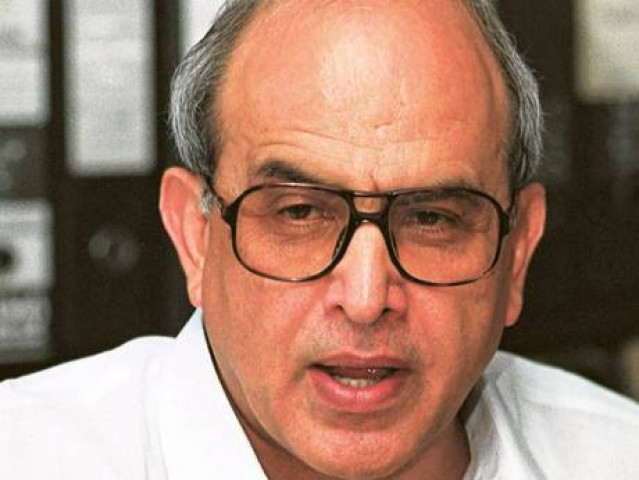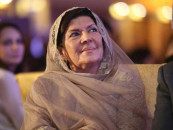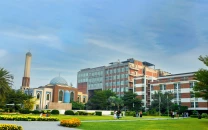Dead politicians still alive — on ECP list
Several dormant and defunct parties still registered with poll supervisory body

PHOTO: AFP
The list on the ECP’s website catalogues as many as 334 parties which is greater than the total number of directly contested seats in any of the country’s legislatures.
Under the Political Parties Act, 2002, every political party is required to regularly hold intra-party elections within a timeframe fixed in its constitution and submit details of its accounts by August 29 every year to retain its status as a registered political group. Failure to do so could cost a party its election symbol.
Election campaign funds: Notices issued to government, Election Commission and NAB
Recently, the ECP conducted a review to find out the exact number of parties fulfilling the basic criteria. It transpired that except for a dozen or more mainstream political parties, most did not qualify to retain their status as registered parties and should have been de-listed.
The ECP list is a quintessential example of official sloppiness plaguing almost every department. Take, for example, Sanaullah Zehri, the incumbent chief minister of Balochistan. Currently, he is the president of the Balochistan chapter of PML-N, but the ECP list shows him as the head of the Balochistan National Democratic Party (BNDP).
According to the ECP records, the BNDP held its last intra-party elections in 2005, while it never shared with the commission details of its assets and accounts. Zehri had merged his party into the PML-N back in 2010.
Similarly, the Balochistan National Party (BNP) of Sardar Akhtar Mengal had been listed in 2002 and the last time it had held intra-party elections was on June 28, 2009. Under its own constitution, the BNP should hold intra-party polls every three years.
The ECP also has no record of the BNP, which has presence both in parliament and in the Balochistan Assembly, ever submitting details of assets and accounts. This begs the question: how had this party been allotted an election symbol?
Another nationalist party from Balochistan, the BNP-Awami, led by Mir Israrullah Zehri, the brother of the incumbent chief minister, also falls in the same category. The ECP records show it never submitted its assets details.
The Mehmood Khan Achakzai-led Pashtunkhwa Milli Awami Party (PkMAP), a key ally of the ruling PML-N, had held its last intra-party polls in 2013. Interestingly, the party also holds important portfolios in the Balochistan cabinet.
PkMAP’s constitution dictates the party to hold intra-party elections every three years. Although PkMAP regularly submits details of its physical assets, it has never given details of its accounts.
Mumtaz Bhutto’s Sindh National Front (SNF), listed as a party in 2002, had held intra-party polls the same year. But since then, it has never even cosmetically held intra-party polls nor has it ever submitted its asset details.
The Pakistan Peoples Party (PPP) was registered with the ECP in 2013. No one knows if it has ever held intra-party polls or except for its Chairman Bilawal Bhutto-Zardari, hardly anyone knows about its office-bearers. However the ECP records show Bilawal’s PPP holding intra-party polls on December 21, 2014.
UC-139 polls: Court stays election of councillors
Similarly, the Pakistan Peoples Party-Parliamentarians (PPP-P), which is now led by former president Asif Ali Zardari and which has been representing the PPP in parliament since 2002, held its intra-party polls on December 27, 2015. According to PPP-P’s constitution, the party should hold intra-party polls every two years, and if one goes by the ECP records, the PPP-P’s internal polls are due on January 24 this year.
Bilawal and Zardari are not the only son and father heading two different parties on the ECP records. The late former interim prime minister, Ghulam Mustafa Jatoi, still heads a party, National Alliance. His son, Ghulam Murtaza Jatoi, heads the National Peoples Party (NPP). Mustafa Jatoi died in 2009 and Murtaza Jatoi is the minister for industries and production in the current federal cabinet. He had merged his party in the PML-N in May 2013.
Ghulam Mustafa is not the only known deceased politician who still heads a party in the ECP records. The late Ajmal Khattak still heads the National Awami Party (NAP) which he had formed after parting ways with Asfandyar Wali’s Awami National Party (ANP). Khattak, who was a renowned writer, poet, and former president of the ANP, had died in 2010.
The Millat Party, formed by former president Farooq Khan Leghari, who died in October 2010, still retains its status as a separate entity in the ECP records. He had first merged his party in the National Alliance and subsequently in the PML-Q in 2004. His son Awais Ahmed Khan Leghari, who is an MNA of the ruling PML-N, is the chairman of the National Assembly’s Foreign Affairs Committee.
Similarly, the Pakistan Peoples Party-Patriots, a party formed by a group of renegade PPP lawmakers after the 2002 elections, still exists as a political party on the ECP list with the late Rao Sikandar Iqbal as its head.
The Muttahida Majlis-e-Amal, an alliance of religious parties which had been listed as a party in 2002, became redundant in 2007, but it is still listed as a registered political party.
Published in The Express Tribune, January 8th, 2017.



















COMMENTS
Comments are moderated and generally will be posted if they are on-topic and not abusive.
For more information, please see our Comments FAQ